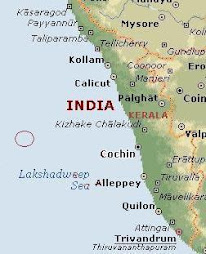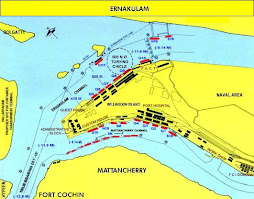(By Adv. V.M. Syam Kumar-Lecturer for Maritime Law, National University for Advanced Legal Studies, Kochi.)
Whether a clearing
and forwarding agent whose name is shown in the Bill
of lading as the agent for delivery at the discharge port is liable
for the damage occasioned to the cargo during transit?
This question was recently considered by a Civil Court in Kochi.
This question was recently considered by a Civil Court in Kochi.
Suit had been
filed jointly by the Insurance company and the consignee alleging that damages had
occasioned to a cargo comprising of Light Black Pepper (Light Berries)
consigned from Hoch-Minh- City, Vietnam to Kochi,
India. Damage
caused was sought to be recovered from both the Carrier (NVOCC) based in Vietnam and their local agent in Kochi India.
The bill of
lading issued by the Carrier contained the name of the agent in Kochi as the person to be
contacted for delivery of goods. The plaintiff based on the said statement in
the Bill of lading arrayed the agent along with the Carrier and sought a decree
against both. The carrier was arrayed as the first defendant and the agent as
the 2nd defendant. (Though the house Bill of lading issued by the
carrier also contained an endorsement that the Carrier was an agent for Ocean Liner,
plaintiffs did not array the Line as a party to the suit).
The court
dismissed the suit against the agent of the Carrier in Kochi on the following reasoning:
“According to the plaintiffs, the 2nd defendant is the agent of the 1st defendant. Counsel for the Plaintiff argues that Ext. A2 Bill of Lading shows that the 2nd defendant has to be contacted for delivery of goods and as per Ext. A2 bill of lading and admission in Ext. A5 reply, second defendant is the agent of the 1st defendant. In Ext. A2 bill of lading the name and address of the 2nd defendant is shown as the contact address for delivery. However the name “…….Line” is given as agent for the carrier. But address of the said …..Line is not given in Ext. A2. When the bill of lading which is the document of contract between the 2nd plaintiff and the 1st defendant specifically provide the name of the …..Line as agent of the carrier, it is the bounden duty of plaintiffs to establish that the 2nd defendant is the agent of the 1st defendant. When the 2nd defendant in the written statement took up the contention that they were only forwarders directed to assist delivery of goods, the plaintiffs could have called for the document showing the contract / direction of the 1st defendant or some other person to the 2nd defendant to assist delivery of goods or sought for a direction from court to the 2nd defendant to produce the document showing their authority to assist in the delivery of goods….” “ When Ext. A2 specifically provide the name of agent of the carrier in it, the 2nd defendant whose name appears in Ext. A2 can be considered as agent of carrier only for the limited purpose of delivery of cargo and not for any other purpose. Absence or lack of address of the agent of carrier in the bill of lading cannot be made a ground for treating the 2nd defendant as agent of the carrier. It is settled principle of law that when the identity of the principal is disclosed, the agent cannot be sued in a legal proceeding. Moreover, there is no privity of contract between the plaintiff and the 2nd defendant and the suit is not maintainable against the 2nd defendant on that count also.”
“According to the plaintiffs, the 2nd defendant is the agent of the 1st defendant. Counsel for the Plaintiff argues that Ext. A2 Bill of Lading shows that the 2nd defendant has to be contacted for delivery of goods and as per Ext. A2 bill of lading and admission in Ext. A5 reply, second defendant is the agent of the 1st defendant. In Ext. A2 bill of lading the name and address of the 2nd defendant is shown as the contact address for delivery. However the name “…….Line” is given as agent for the carrier. But address of the said …..Line is not given in Ext. A2. When the bill of lading which is the document of contract between the 2nd plaintiff and the 1st defendant specifically provide the name of the …..Line as agent of the carrier, it is the bounden duty of plaintiffs to establish that the 2nd defendant is the agent of the 1st defendant. When the 2nd defendant in the written statement took up the contention that they were only forwarders directed to assist delivery of goods, the plaintiffs could have called for the document showing the contract / direction of the 1st defendant or some other person to the 2nd defendant to assist delivery of goods or sought for a direction from court to the 2nd defendant to produce the document showing their authority to assist in the delivery of goods….” “ When Ext. A2 specifically provide the name of agent of the carrier in it, the 2nd defendant whose name appears in Ext. A2 can be considered as agent of carrier only for the limited purpose of delivery of cargo and not for any other purpose. Absence or lack of address of the agent of carrier in the bill of lading cannot be made a ground for treating the 2nd defendant as agent of the carrier. It is settled principle of law that when the identity of the principal is disclosed, the agent cannot be sued in a legal proceeding. Moreover, there is no privity of contract between the plaintiff and the 2nd defendant and the suit is not maintainable against the 2nd defendant on that count also.”
Holding thus
the Court dismissed the suit filed against the agent however passing a Decree for
the plaint claim against the first defendant carrier.
The case
assumes relevance for steamer agents and local clearing and forwarding agents
who are at times proceeded against by the consignee terming them as the agent
of the carrier/ the line. Such agents are easy targets in suits seeking
damages. Courts view in the above discussed judgment is encouraging for such
clearing and forwarding agents whose name is mentioned as delivery agent of the
carrier in the bill of lading. Such agents have nothing to do with the loss or
damage during transit. However, for the consignee these agents appear to be sitting
ducks. The foreign carrier (most of the time an NVOCC), who is primarily answerable
for the alleged claims could be ex parte thus leaving the agent alone to
contest the suit. Thus it becomes more onerous to the clearing and forwarding
agent to put up defenses which ought to be taken up by the foreign carrier. The
present judgment safe guards the genuine interests of such an agent whose name is
mentioned as delivery agent of the carrier in the bill of lading against claims for ocean transit damage.
* * *



























